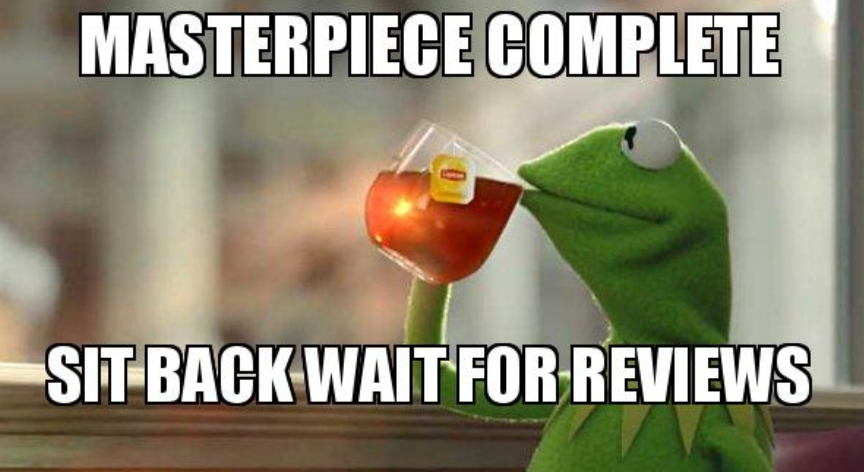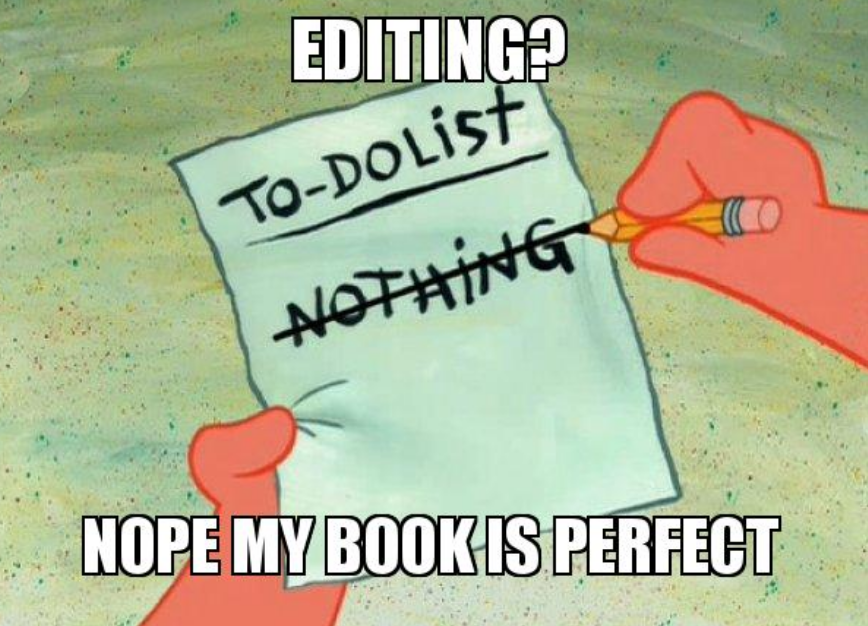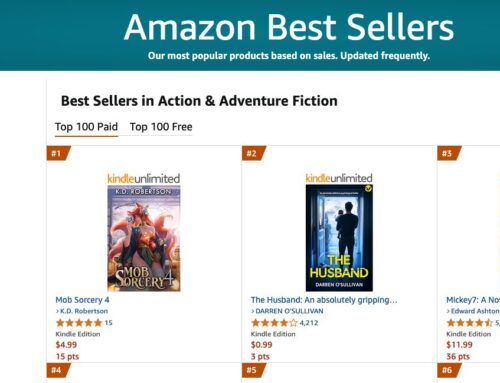It’s tempting to convince yourself, as a native speaker of the language you just wrote a book in, proffering your English degree perhaps, that you are in fact exactly the right person to edit your own book. What does it mean to have your book edited, and why is it that nobody can edit their own words? Editor Cate Baum discusses.
Your brain literally cannot do it
You’ve heard the phrase “wood for the trees.” This is precisely what happens to you when you try to re-read words you have written and read many times over. Instead of actually making your brain look more carefully at the words, your brain starts to gloss over and fill in the errors the more you look at a page.
We build what are called “brain maps” that allow us to take short cuts when we already know the destination, and trying to proof read your own story is a perfect example of a place that the brain is confident of the ending. It’s what ScienceABC calls “a fight between your brain and your eyes.”
Be assured nobody can ever proofread a book at a catch rate of 100% however, and it’s very prudent to have a proofread done at least twice by either a different editor, or the same editor with a break of time between the assignments so that your editor also does not suffer with “wood for trees” fatigue. For further reading on this, take a look at this article at Wired about brain maps and editing.
You are not trained to do it
Professional editors, with many years’ experience, will be able to proofread with an error rate of high eighties to nineties out of 100. 85% up is considered fantastic by all the major professional editor bodies in the US, Canada, and UK.
A professional proofreader looks for patterns in words rather than reading the actual text, as if the words are more like equations that must balance out. It’s basically a technique whereby the words do not become a narrative as much as form sentences and paragraphs that make the best possible sense. If you are the author, you may be more concerned with the aesthetic and emotional sensibilities of a text, and you may find yourself unable to cut out anything that contradicts your ideas “as a writer.”
The difference between editing and editing
Often a writer will think they have “edited” their book. This can mean they have checked spelling and grammar, or it can mean they are going over huge portions of the book for narrative problems such as too much “tell” not enough “show,” or plot holes.
A content/copy edit will be carried out by a professional editor as a creative assessment, but factoring in commercial aspects such as whether your book might be up for book deal, “sellability,” and trends. So even if you like a plot point, your editor might have some further information on what readers want that will transform your story to market. Don’t be stubborn here – nobody wants to sell zero books.
Are you ready to destroy your book?
A good content edit should elevate your book to an acceptable standard whatever state it was in to begin with, but bear in mind that you will be expected to work on your book after a content edit to correct, enhance, augment, and tear out whole characters, plot lines, and themes to produce a solid text. This can be very upsetting, but once you get over yourself you may find your editor was right and f
ind yourself apologizing for the infantile outburst you had on Monday when you read that she wanted you to get rid of your favorite character or chapter. Yes folks, I have told an author to destroy three or four chapters, five characters, and one whole plot line to improve her book, and she has got constant 4-5 star reviews on Amazon up from her paltry 2-3 stars in the last edition.
Self-editing will never get your book that ripped. Sometimes you just have to take it to make it. If you can’t do it, just remember Tony Hancock in “The Rebel.” He creates a genius sculpture, hailed by critics, but when he refuses to get help on his second work, he gets called out as a hack.

Will you admit it’s best to get professional help?
Are you ready to go against your artistic feelings?
If you self-edit, how much nonsense that should have stayed in the planning stage of the book is going to stay in? How many plot lines will you feel you can’t get rid of because you enjoyed writing them, and you think your reader might enjoy them too? How much dialogue did you write like a scene from a movie, when a book should be made of descriptive scenes, not dialogue?
If you don’t address the tough issues, the reader will review your book as it is, warts and all. This can lead to low star reviews on Amazon, and any promo you did will be wasted as sales fall off.
Get An Opinion
You need a second opinion on anything in life. Did you ask a friend about the shade of lipstick before you bought it? How about that tin of beans – did your partner say which brand they preferred? And yet, this book you just slaved over for maybe years is not worth an opinion? An editor will give you a non-emotional, professional opinion that you need to finish your work.
Beta Readers – Not Professional Editors
Beta readers seem to have become “the poor man’s editors” because some authors have taken to getting friends and family to give their thoughts of the book instead of paying for an editor. This is not the purpose of a Beta Reader. Beta Readers, as the name suggests, are for the final read of the edited book before you put it on sale, and that is absolutely what you should use them for, not for editing, because they are not editors trained to edit. They are a reflection of your reader.
A word on specialist edits
Editing technical texts
If you plan to release a book on a non-fiction subject that uses technical terms and phrases, you will have to hire a technical editor from your field. Fiction editors will mostly not be able to edit your book properly.
Second-language English specialist editors
If your first language is not English, it is essential to find an editor who understands what it is like to speak another language. I have specialized in editing books for second-language English authors for years, mostly because I am multilingual in French and Spanish, as well as speaking a further three or four languages from time to time (Scandinavian languages, Italian, Latin, Catalan, German etc.). Understanding linguistics becomes more important for these kinds of edits, so seek out someone like me to help with these sorts of edits.
Remember the absolute GOLDEN RULE is that your editor must always be, no matter how qualified in other editing skills or the English language, native to the language your book is written in. There is a nuance that nobody can learn in a language that will finesse your book to a proper standard when you stick to this rule. You will never know if your editor did a good job if you yourself are not native speaking otherwise.
Children’s books
It’s not advisable in any case, in my opinion, to even try and write a book for smaller children without being utterly qualified and trained in child development. This is because most people don’t understand the stringent flaming hoops parents insist upon these days, rightly so, with anything that their precious one is consuming. Most parents stick to tried and tested books and publishers, and will not be willing to try out anything else in case it is in some way inappropriate.
The best thing to do here if you still insist on this route is to seek a children’s book specialist editor, preferably one who has worked for a big publishers that is known for its children’s books. This is the only way to get your language, readability, illustrations, design, and subject matter age appropriate and stringently in line with child developmental guidelines. Otherwise you could be heading for a massive crash in reviews on Amazon – if anyone buys the book at all.
It may be better to question why you have decided to write for small children with no experience of it. If the reason is you have a very short story, no pictures, and no idea what age group it is for, that’s a real concern. Maybe look at writing for older children or YA fiction, which is more flexible in terms of theme and language.
How to make the most of your edit
This process is followed by self-publishers, publishers, and indie publishers alike.
• Do a spellcheck using Word
• Make sure you have finished writing your book in its entirety because no editor will re-edit a book unless you pay them again!
• Hire a professional editor to content/copy edit your book – not a friend!
• Work on your book again with all notes given from your editor
• Hire an editor to proofread your book
• Put the manuscript in a drawer
• Read it after one month to check you like it
• If you don’t, go back to the top of this list
• If you do, hire an editor to proofread your book
• Hire beta readers to read your book
• Get a professional reviewer to write a review of your book. Amazon values Editorial Reviews highly, featuring them above Customer Reviews.
• Publish your book with a quote from the review on the back of your paperback, or on your Editorial Reviews section on Amazon and Goodreads.
Get an Editorial Review | Get Amazon Sales & Reviews | Get Edited | Get Beta Readers | Enter the SPR Book Awards | Other Marketing Services























Leave A Comment